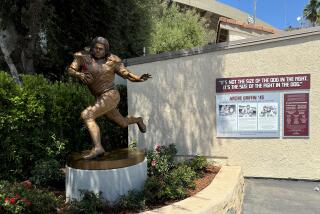Hall of Famer Doak Walker Dead at 71
- Share via
DENVER — Doak Walker, the 1948 Heisman Trophy winner who starred on two NFL championship teams and was paralyzed in a skiing accident earlier this year, died Sunday at 71.
Walker died at Routt Hospital in Steamboat Springs, the ski resort about 100 miles from Denver where he had lived. The hospital said the cause of death was complications from the paralysis, which he had fought with the same determination he showed on the football field.
Walker was injured Jan. 30 when he hit a change of terrain, was thrown into the air and slammed to the ground. The injury made it difficult for him to talk.
He had regained some of his ability to talk through rehabilitation, during which he received thousands of letters and faxes from well-wishers and fans worldwide.
“His eyes would come alive, his expression was wonderful, he was able to talk in short phrases,” said Rod Hanna, a family spokesman.
The accident that robbed him of the use of his arms and legs was especially tragic for a Hall of Fame football player known for his breathtaking scoring runs.
Walker, born and raised in Dallas, ended his football career in 1956 after a legendary four years at Southern Methodist University and six years with the Detroit Lions. He is immortalized by the annual Doak Walker Award, which honors the nation’s top college running back.
“I don’t think he had any peers. He was the last of the great single wing tailbacks,” said Jim Sid Wright, who also played at SMU in the ‘40s but not with Walker. “He was the best all-around tailback that I ever saw.”
Walker did everything, playing running back, wide receiver, quarterback and defensive back in college and the NFL. He also punted and returned punts and kicks.
The moment that best summed up Walker’s college career came against Texas Christian in 1947. With the Mustangs trailing, 19-13, and 1:40 to play, Walker returned a kickoff 75 yards to set up his touchdown reception that preserved SMU’s undefeated season.
That won the hearts of SMU fans, who began flocking to see the Mustangs and forced the school to move its games from Ownby Stadium to the 47,000-seat Cotton Bowl in 1948. By his senior season, the Cotton Bowl, then expanded to seat 75,000, was called “The House That Walker Built.” He remains the only SMU player to win the Heisman.
“You just had to see him to believe what he could do,” said Raleigh Blakely of Dallas, an SMU tight end from 1946-48.
“No one ever questioned his leadership. He’d kneel down and say, ‘OK, we’ve got to do this,’ and everybody would just bust their butt for him.”
Walker was an All-Pro four times and helped Detroit win two NFL championships. He was elected to the Pro Football Hall of Fame in 1986 and also is a member of the College Football Hall of Fame.
Walker also was a substitute on the SMU basketball team and played outfield for the baseball team.
“Other than golf, I never really tried a sport that, inside of 30 minutes, I couldn’t play pretty good,” Walker once said.
Walker also touched people with his modesty.
In 1949, he tried to turn down an All-American selection by famed sports writer Grantland Rice because injuries prevented him from playing the entire season.
Walker abruptly ended his career after the 1955 season to concentrate on his business interests that could make him more money than an NFL career.
“No, I don’t have any regrets about quitting football when I did,” Walker once said. “I’m not sorry because I’ve got all my teeth, both knees -- and most of my faculties.”
After his playing days, Walker took a public relations job with a construction company and married Skeeter Werner, a former Olympic skier from Steamboat Springs.
He is survived by his wife, four children and four grandchildren.
More to Read
Go beyond the scoreboard
Get the latest on L.A.'s teams in the daily Sports Report newsletter.
You may occasionally receive promotional content from the Los Angeles Times.










